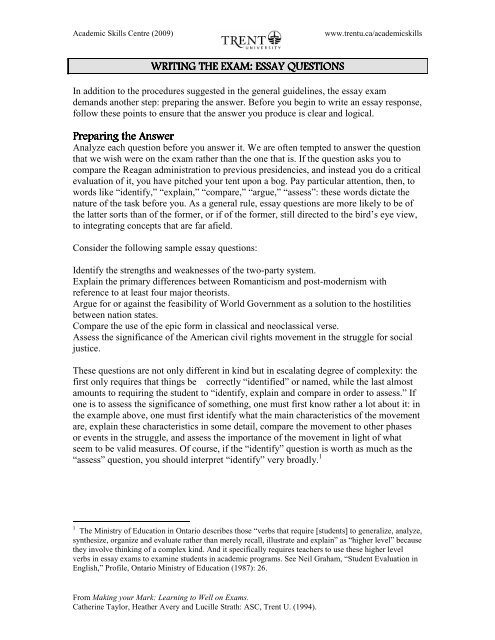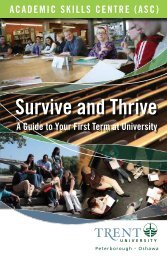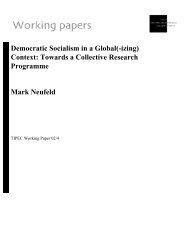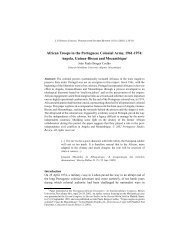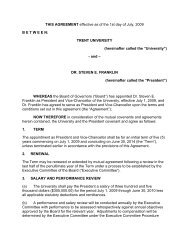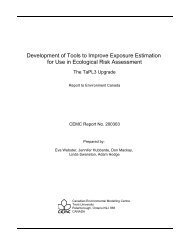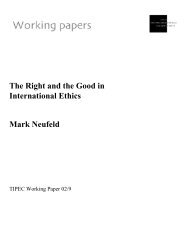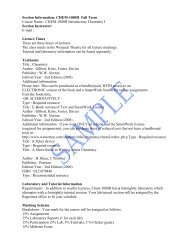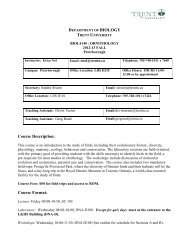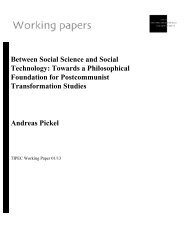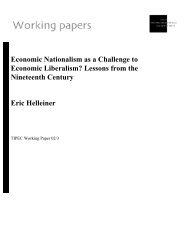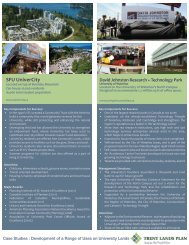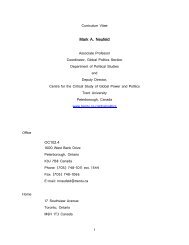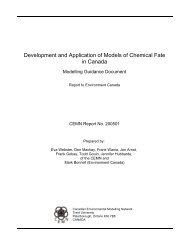Writing the essay question
Writing the essay question
Writing the essay question
You also want an ePaper? Increase the reach of your titles
YUMPU automatically turns print PDFs into web optimized ePapers that Google loves.
Academic Skills Centre (2009)<br />
www.trentu.ca/academicskills<br />
WRITING THE EXAM: ESSAY QUESTIONS<br />
In addition to <strong>the</strong> procedures suggested in <strong>the</strong> general guidelines, <strong>the</strong> <strong>essay</strong> exam<br />
demands ano<strong>the</strong>r step: preparing <strong>the</strong> answer. Before you begin to write an <strong>essay</strong> response,<br />
follow <strong>the</strong>se points to ensure that <strong>the</strong> answer you produce is clear and logical.<br />
Preparing <strong>the</strong> Answer<br />
Analyze each <strong>question</strong> before you answer it. We are often tempted to answer <strong>the</strong> <strong>question</strong><br />
that we wish were on <strong>the</strong> exam ra<strong>the</strong>r than <strong>the</strong> one that is. If <strong>the</strong> <strong>question</strong> asks you to<br />
compare <strong>the</strong> Reagan administration to previous presidencies, and instead you do a critical<br />
evaluation of it, you have pitched your tent upon a bog. Pay particular attention, <strong>the</strong>n, to<br />
words like “identify,” “explain,” “compare,” “argue,” “assess”: <strong>the</strong>se words dictate <strong>the</strong><br />
nature of <strong>the</strong> task before you. As a general rule, <strong>essay</strong> <strong>question</strong>s are more likely to be of<br />
<strong>the</strong> latter sorts than of <strong>the</strong> former, or if of <strong>the</strong> former, still directed to <strong>the</strong> bird’s eye view,<br />
to integrating concepts that are far afield.<br />
Consider <strong>the</strong> following sample <strong>essay</strong> <strong>question</strong>s:<br />
Identify <strong>the</strong> strengths and weaknesses of <strong>the</strong> two-party system.<br />
Explain <strong>the</strong> primary differences between Romanticism and post-modernism with<br />
reference to at least four major <strong>the</strong>orists.<br />
Argue for or against <strong>the</strong> feasibility of World Government as a solution to <strong>the</strong> hostilities<br />
between nation states.<br />
Compare <strong>the</strong> use of <strong>the</strong> epic form in classical and neoclassical verse.<br />
Assess <strong>the</strong> significance of <strong>the</strong> American civil rights movement in <strong>the</strong> struggle for social<br />
justice.<br />
These <strong>question</strong>s are not only different in kind but in escalating degree of complexity: <strong>the</strong><br />
first only requires that things be correctly “identified” or named, while <strong>the</strong> last almost<br />
amounts to requiring <strong>the</strong> student to “identify, explain and compare in order to assess.” If<br />
one is to assess <strong>the</strong> significance of something, one must first know ra<strong>the</strong>r a lot about it: in<br />
<strong>the</strong> example above, one must first identify what <strong>the</strong> main characteristics of <strong>the</strong> movement<br />
are, explain <strong>the</strong>se characteristics in some detail, compare <strong>the</strong> movement to o<strong>the</strong>r phases<br />
or events in <strong>the</strong> struggle, and assess <strong>the</strong> importance of <strong>the</strong> movement in light of what<br />
seem to be valid measures. Of course, if <strong>the</strong> “identify” <strong>question</strong> is worth as much as <strong>the</strong><br />
“assess” <strong>question</strong>, you should interpret “identify” very broadly. 1<br />
1 The Ministry of Education in Ontario describes those “verbs that require [students] to generalize, analyze,<br />
syn<strong>the</strong>size, organize and evaluate ra<strong>the</strong>r than merely recall, illustrate and explain” as “higher level” because<br />
<strong>the</strong>y involve thinking of a complex kind. And it specifically requires teachers to use <strong>the</strong>se higher level<br />
verbs in <strong>essay</strong> exams to examine students in academic programs. See Neil Graham, “Student Evaluation in<br />
English,” Profile, Ontario Ministry of Education (1987): 26.<br />
From Making your Mark: Learning to Well on Exams.<br />
Ca<strong>the</strong>rine Taylor, Hea<strong>the</strong>r Avery and Lucille Strath: ASC, Trent U. (1994).
Academic Skills Centre (2009)<br />
www.trentu.ca/academicskills<br />
There are overlaps and crossovers, of course, but most verbs commonly encountered in<br />
<strong>essay</strong> <strong>question</strong>s belong primarily in one of <strong>the</strong>se five categories:<br />
Identify Explain Compare Argue Assess<br />
Enumerate<br />
List<br />
Describe<br />
Define<br />
Paraphrase<br />
Summarize<br />
State<br />
Analyze<br />
Discuss<br />
Account for<br />
Illustrate<br />
Trace<br />
Outline<br />
Contrast<br />
Relate<br />
Distinguish<br />
Agree<br />
Disagree<br />
Debate<br />
Defend<br />
Justify<br />
Prove<br />
Criticize<br />
Evaluate<br />
Interpret<br />
Propose<br />
Recommend<br />
Review<br />
Identify Questions. As a general rule, verbs in <strong>the</strong> “Identify” column are perfunctory<br />
little staff sergeants. Nei<strong>the</strong>r solicitous nor tolerant of your opinions, such verbs direct<br />
you to hit <strong>the</strong> nail on <strong>the</strong> head, pin <strong>the</strong> butterfly to <strong>the</strong> sample board, snap <strong>the</strong> shot, not to<br />
philosophize for days about <strong>the</strong> subtleties of its construction: “Enumerate <strong>the</strong> varieties of<br />
begonia in Bulgaria”; “List <strong>the</strong> seven deadly sins”; “Summarize Kant’s argument for <strong>the</strong><br />
Categorical Imperative.” Such <strong>question</strong>s are less common than <strong>the</strong> o<strong>the</strong>rs on <strong>essay</strong> exams<br />
because <strong>the</strong>y elicit concise paragraphs, not developed answers.<br />
Explain Questions. “Explain” verbs are less crude in <strong>the</strong>ir requests, and more<br />
demanding: <strong>the</strong>y are <strong>the</strong> “why” to Identify’s “what.” One is often expected to establish<br />
cause and effect relationships in explain <strong>question</strong>s. Thus, one is not asked to<br />
“Enumerate <strong>the</strong> begonias of Bulgaria,” but to “Discuss <strong>the</strong> processes by which Bulgarian<br />
begonias variegated into <strong>the</strong>ir present prolificacy.”<br />
Compare Questions. These are popular among professors not because <strong>the</strong> detection of<br />
similarities and differences is particularly worthwhile in itself, but because <strong>the</strong>y<br />
encourage students to undertake more complex analyses than <strong>the</strong>y might if asked to<br />
discuss only one book, or play, or political system, or whatever. We see a thing more<br />
precisely and astutely when we have been asked to distinguish it from something else.<br />
The student, <strong>the</strong>n, who responds by writing for <strong>the</strong> first half of <strong>the</strong> answer on<br />
Tweedledum, and <strong>the</strong> second half on Tweedledee, has misinterpreted <strong>the</strong> professor’s<br />
intent: to bring <strong>the</strong> one and <strong>the</strong> o<strong>the</strong>r toge<strong>the</strong>r.<br />
Tweedledum<br />
likes chamber music<br />
reads Russian Novels<br />
looks like a jerk, wears a beanie, goes by<br />
"Tweedle"<br />
gives money to <strong>the</strong> Trotskyites<br />
Tweedledee<br />
same as L'dum<br />
except likes <strong>the</strong> Kazoo & Jimmy Swaggart<br />
The sparks are much more likely to fly if you organize by similarities and differences:<br />
From Making your Mark: Learning to Well on Exams.<br />
Ca<strong>the</strong>rine Taylor, Hea<strong>the</strong>r Avery and Lucille Strath: ASC, Trent U. (1994).
Academic Skills Centre (2009)<br />
www.trentu.ca/academicskills<br />
Similarities<br />
A. both have intellectual interests<br />
- L'dum's chamber music & L'dee's kazoo<br />
- both read Russian novels, in Russian<br />
B. superficial resemblance<br />
- both look like jerks<br />
- wear beanies<br />
- answer to Tweedle<br />
Differences<br />
A. Political - one a Trot, <strong>the</strong> o<strong>the</strong>r a Jimmy<br />
Swaggart supporter<br />
B. Financial<br />
- L'dum's dismay at T'dee's contributions to<br />
religious broadcasters<br />
- L'dee's dismay at L'dum's contributions to<br />
<strong>the</strong> Party<br />
Argue Questions. All <strong>essay</strong>s are forms of argument in <strong>the</strong> general sense of being<br />
developed from a premise towards a conclusion via a structure of support built on logic<br />
and evidence. Some, though, are argumentative in <strong>the</strong> more common sense of requiring<br />
that a position be defended against potential detractors. “Prove that Francis Bacon wrote<br />
what goes by <strong>the</strong> misnomer, <strong>the</strong> Shakespearean canon.”<br />
Assess Questions. Just as all <strong>essay</strong> <strong>question</strong>s require an answer in <strong>the</strong> form of an<br />
argument, all require that <strong>the</strong> writer exercise his judgement or powers of discrimination in<br />
determining what is relevant or not, significant or not, au<strong>the</strong>ntic or not. “Assess”<br />
<strong>question</strong>s require that judgement become <strong>the</strong> focus and purpose of <strong>the</strong> <strong>essay</strong>. Thus,<br />
“Evaluate Thought, Action and Passion in its attempt to describe <strong>the</strong> interrelationships<br />
among various disciplines.” One is frequently asked to measure degree, to answer, “How<br />
well?” To do this, sensible criteria must be established against which to judge <strong>the</strong> subject<br />
in <strong>question</strong>, and <strong>the</strong>n one’s judgement must be defended.<br />
Sketch <strong>the</strong> answer. Take a few minutes at <strong>the</strong> beginning of each <strong>question</strong> to jot down<br />
your main ideas on <strong>the</strong> blank side of <strong>the</strong> examination booklet. Approximately five<br />
minutes for a half-hour <strong>question</strong> should be about right. A little sketch, remember: an<br />
outline that turns into a rough draft is a luxury that is normally not worth <strong>the</strong> time on an<br />
exam. Use whatever outlining method you are comfortable with — mind map or<br />
conventional hierarchical structure. 2 Don’t abandon hope if you feel your answer is<br />
incomplete or lacks focus. Instead, see what you can come up with, and invent a <strong>the</strong>sis<br />
that makes good use of it.<br />
<strong>Writing</strong> your response<br />
Once you’ve outlined your argument, you are ready to begin writing. In your <strong>essay</strong><br />
answer:<br />
Aim to produce <strong>the</strong> Grateful Examiner. Whatever <strong>the</strong> <strong>question</strong>, try to answer it in an<br />
organized way. Remember that your professor is reading dozens and dozens of exam<br />
papers, most of which display student writing — and student handwriting — at its very<br />
worst. Therefore, write reasonably neatly, every o<strong>the</strong>r line, in visible ink, and show<br />
intelligence at all costs. If you can’t address <strong>the</strong> topic, come as close as possible. This<br />
2 For an extensive discussion of outlines, see Thinking It Through, 91-107.<br />
From Making your Mark: Learning to Well on Exams.<br />
Ca<strong>the</strong>rine Taylor, Hea<strong>the</strong>r Avery and Lucille Strath: ASC, Trent U. (1994).
Academic Skills Centre (2009)<br />
www.trentu.ca/academicskills<br />
does not mean pad your answer with irrelevant bumph; you will not gain by seeming<br />
confused, and perhaps will lose credit for what you are sure of. Markers are desperate for<br />
evidence of substance, passion, imagination, and engagement with <strong>the</strong> subject, and will<br />
reward it. They want to see your thinking, not just a recitation of facts.<br />
Essential to <strong>the</strong> production of gratitude in <strong>the</strong> examiner is that you write in a style and<br />
tone appropriately respectful of <strong>the</strong> subject matter. Wit is welcome; flippancy flops. Do<br />
not dismiss <strong>the</strong> professor’s favourite political leader as an iguana-head.<br />
Balance Argument and Examples. Frequently, students lose marks on <strong>essay</strong> exams, not<br />
because <strong>the</strong>y are unfamiliar with <strong>the</strong> course material, but because <strong>the</strong>y do not present<br />
<strong>the</strong>ir knowledge effectively. Professors prepare examination <strong>question</strong>s with certain<br />
expectations in mind; <strong>the</strong>y know in advance what arguments and details need to be<br />
discussed in order for a response to be considered satisfactory, and <strong>the</strong>y grade according<br />
to <strong>the</strong>se expectations. Hence a student may respond accurately to <strong>the</strong> <strong>question</strong> posed, but<br />
if <strong>the</strong> expected arguments and details are lacking, <strong>the</strong> paper will probably receive a low<br />
grade.<br />
Say an exam <strong>question</strong> reads, “Discuss <strong>the</strong> effects of American cultural influence on <strong>the</strong><br />
Canadian arts scene.” A student response outlines, in general terms, <strong>the</strong> social, political<br />
and economic effects of American culture, but fails to provide concrete examples of any<br />
of <strong>the</strong>se. The response earns a C because <strong>the</strong> professor cannot judge whe<strong>the</strong>r <strong>the</strong> student<br />
understands <strong>the</strong> material, and has simply neglected to provide examples of <strong>the</strong> effects, or<br />
whe<strong>the</strong>r <strong>the</strong> student never understood <strong>the</strong> issue fully, and could not provide examples.<br />
Ano<strong>the</strong>r response to <strong>the</strong> same <strong>question</strong> might not discuss economic issues, but because<br />
<strong>the</strong> comments on social and political effects are well-detailed, <strong>the</strong> professor can better<br />
assess <strong>the</strong> student’s knowledge, and <strong>the</strong> answer earns a B.<br />
Respect <strong>the</strong> Art of Presentation. There is an art to making <strong>the</strong> best of your knowledge<br />
on <strong>the</strong> exam; <strong>the</strong> B student practised <strong>the</strong> art, and <strong>the</strong> C student did not. Yet it is entirely<br />
possible that <strong>the</strong> latter’s grasp of <strong>the</strong> material was superior to <strong>the</strong> former’s. Though <strong>the</strong><br />
unfairness inherent in this unfortunate situation frustrates professors immensely, <strong>the</strong>y can<br />
only give you marks for what you do, not for what <strong>the</strong>y imagine you capable of doing.<br />
The well-prepared student understands what markers look for in an exam, and has learned<br />
how to fashion a response that provides it.<br />
Begin, always, by answering <strong>the</strong> <strong>question</strong>. That is, in <strong>the</strong> first paragraph of your answer,<br />
include one sentence that indicates <strong>the</strong> line of reasoning in <strong>the</strong> rest of your response.<br />
For example, in answer to <strong>the</strong> <strong>question</strong> above, you might write, “American cultural<br />
influence on <strong>the</strong> Canadian arts extends to many areas, and in general has had a negative<br />
influence on Canadian cultural growth.” Even if you write little else, this statement at<br />
least would provide your professor with an indication that you had considered <strong>the</strong><br />
<strong>question</strong>. Think of <strong>the</strong> one sentence as a <strong>the</strong>sis statement, but do not labour over it <strong>the</strong><br />
way you might for a formal <strong>essay</strong>. Simply respond to <strong>the</strong> <strong>question</strong> directly, and get on<br />
with your answer. The <strong>the</strong>sis will give your paper clarity and integrate <strong>the</strong> different points<br />
From Making your Mark: Learning to Well on Exams.<br />
Ca<strong>the</strong>rine Taylor, Hea<strong>the</strong>r Avery and Lucille Strath: ASC, Trent U. (1994).
Academic Skills Centre (2009)<br />
www.trentu.ca/academicskills<br />
you make into a single point of view, <strong>the</strong> result being that your argument is easier to see,<br />
and <strong>the</strong> easier it is to see, <strong>the</strong> easier it is to festoon with checkmarks.<br />
Your <strong>the</strong>sis need not be passionate or controversial. If you are asked something like,<br />
“Identify <strong>the</strong> parts of <strong>the</strong> bull- frog,” you would be thought eccentric if you took a stand<br />
on what you think those parts are: “Bull-frog parts comprise <strong>the</strong> head, <strong>the</strong> body, <strong>the</strong> little<br />
front arms and <strong>the</strong> great hind legs for jumping, by Jove, whatever <strong>the</strong> enemies of truth<br />
might preach.” But you still need a <strong>the</strong>sis, in <strong>the</strong> sense of an organizational principle from<br />
which to develop your answer. In this case, <strong>the</strong> <strong>the</strong>sis statement might be, “The parts of<br />
<strong>the</strong> bull-frog may be divided by <strong>the</strong>ir three different functions: leaping, croaking, and<br />
breeding, each of which involves several parts.” It ain’t poetry, but it does answer <strong>the</strong><br />
<strong>question</strong> directly and indicate <strong>the</strong> way in which you intend to organize your answer.<br />
If you do not have an immediate stance to take in response to <strong>the</strong> <strong>question</strong>, jot down <strong>the</strong><br />
points that come to mind on <strong>the</strong> subject and <strong>the</strong>n ask yourself, “What overall position do<br />
my ideas point towards?” For example, you must answer <strong>the</strong> <strong>question</strong>, “Evaluate <strong>the</strong><br />
success of <strong>the</strong> CCF,” and you do not have a deeply felt opinion on <strong>the</strong> subject. List <strong>the</strong><br />
pros and cons, since you are being asked to assess something.<br />
PROS<br />
- social programs: U.I.C., Medicare,<br />
Pensions, Occupational Health & Safety<br />
- civil rights<br />
- mass membership<br />
- popular leaders<br />
- support of trade unions & extra<br />
parliamentary groups<br />
- prairie strength, Western Prov's<br />
CONS<br />
regionalism<br />
never formed a national government<br />
few large donors<br />
ambitious goals (costly)<br />
lack of support from Central & Eastern<br />
Prov's.<br />
Okay. so <strong>the</strong> CCF was successful in some terms, not in o<strong>the</strong>rs. Compose a <strong>the</strong>sis<br />
statement that reflects what information you are capable of presenting on <strong>the</strong> subject,<br />
even though it seems to be a bit of a hodge-podge: social programs, civil rights, electoral<br />
record, party history. Here’s one:<br />
The CCF did not achieve <strong>the</strong> original ambitious goals on which it was founded, and never<br />
formed a federal government, but it was successful in entrenching most of its social<br />
service and civil rights policies into Canadian government.<br />
The cleverly-worded <strong>the</strong>sis will constellate disparate elements into one integrated point<br />
of view, and thus give <strong>the</strong> Grateful Examiner a way of reading your answer as <strong>the</strong> logical<br />
development of a sensible <strong>the</strong>sis, not <strong>the</strong> grab-bag of isolated points that it might have<br />
seemed o<strong>the</strong>rwise.<br />
Be as specific as possible. Most exam <strong>essay</strong> <strong>question</strong>s will address general course<br />
<strong>the</strong>mes, issues that anyone who attended <strong>the</strong> lectures would be familiar with. To excel on<br />
an exam, <strong>the</strong>refore, you must establish that you are not merely acquainted with <strong>the</strong>se<br />
From Making your Mark: Learning to Well on Exams.<br />
Ca<strong>the</strong>rine Taylor, Hea<strong>the</strong>r Avery and Lucille Strath: ASC, Trent U. (1994).
Academic Skills Centre (2009)<br />
www.trentu.ca/academicskills<br />
<strong>the</strong>mes, but that you have considered <strong>the</strong>m carefully and are aware of <strong>the</strong>ir connections to<br />
and ramifications for <strong>the</strong> more particular material discussed in <strong>the</strong> course. In a literature<br />
course, this means numerous references to <strong>the</strong> texts studied (and direct quotations if you<br />
can manage it); in a history course, it might mean using a specific historical event to<br />
illustrate a broader <strong>the</strong>ory. In psychology, <strong>the</strong> student might make reference to relevant<br />
experiments, in geography to particular landmarks.<br />
Such a task should not be difficult for you, if you have kept up with readings and<br />
attended lectures. You do not need to provide several examples; you do not need to<br />
remember exact details of examples. Instead, you must show that you understand a<br />
concept well enough to think of a situation where it applies. To return to <strong>the</strong> <strong>question</strong> on<br />
American cultural influence, one example might be <strong>the</strong> popularity of Viet Nam War<br />
movies among Canadians, despite <strong>the</strong> fact that Canada was never directly involved in this<br />
war. There would be no need here to provide statistics about <strong>the</strong> number of Viet Nam<br />
War movies, or <strong>the</strong> number of Canadians who watch <strong>the</strong>m; just showing <strong>the</strong> professor<br />
that you can connect <strong>the</strong> general concept (American cultural influence) to a specific<br />
example (Viet Nam War movies in Canada) is enough. But don’t forget to make <strong>the</strong><br />
connection explicit. Explain your examples and details. “An example of this would be<br />
Viet Nam movies” doesn’t tell <strong>the</strong> professor anything. Take up space with your details;<br />
far better to cover a small chunk of material well than to provide a whirlwind tour of your<br />
course that suggests nothing more than that you have seen <strong>the</strong> syllabus.<br />
Don’t worry about style. Many students worry about proper <strong>essay</strong> style in exams: are<br />
<strong>the</strong>y losing marks by not having a formal introduction, a conclusion, well-developed<br />
paragraphs? Some advice: worry about something else. Provide reasonable introductions<br />
and conclusions as guides to your response, but do not waste time on <strong>the</strong>m. Professors at<br />
this point are marking for content, not style. Elegantly worded introductions, indeed are<br />
lost on a professor who wants to finish marking exams and get on with summer research.<br />
They also represent a loss of valuable exam time. The twenty minutes it takes to get <strong>the</strong><br />
correctly-worded introduction to <strong>the</strong> first <strong>question</strong> you tackle might better be spent<br />
fleshing out your response to <strong>the</strong> third <strong>question</strong>. Given this emphasis on explaining<br />
details, <strong>the</strong> student might ask, “Is it ever worthwhile to write a point-form answer to an<br />
<strong>essay</strong> <strong>question</strong>?” In certain circumstances, yes. If you are running out of time on <strong>the</strong> last<br />
<strong>question</strong>, or have an eleventh- hour burst of inspiration on a <strong>question</strong> that hi<strong>the</strong>rto had<br />
you stumped, finish up in point form. Try to write complete introductory and<br />
concluding sentences for any section you present in this manner.<br />
Point-form answers will probably never earn a student As, but if <strong>the</strong>y are well-detailed,<br />
and if <strong>the</strong> points show <strong>the</strong> connection between <strong>the</strong> issues addressed and <strong>the</strong> examples<br />
provided, often professors can give <strong>the</strong>m better than a passing grade. Indeed, point-form<br />
answers frequently score quite well because <strong>the</strong> student does not waste time devising<br />
elaborate rhetorical structures, and thus gets more content into <strong>the</strong> exam booklet.<br />
A note of caution, however: if your point form is as good as your paragraphs, your<br />
paragraphs leave something to be desired. And while <strong>the</strong> professor may mark one pointform<br />
answer sympa<strong>the</strong>tically, <strong>the</strong> annoying staccato effect of page after page of dashes<br />
From Making your Mark: Learning to Well on Exams.<br />
Ca<strong>the</strong>rine Taylor, Hea<strong>the</strong>r Avery and Lucille Strath: ASC, Trent U. (1994).
Academic Skills Centre (2009)<br />
www.trentu.ca/academicskills<br />
would harden <strong>the</strong> heart of <strong>the</strong> most benevolent of markers. Paragraphs are commonly<br />
thought in academic circles to be an improvement on points. Therefore, try to observe <strong>the</strong><br />
same rules for paragraphs that hold for regular <strong>essay</strong>s: one main point per paragraph, that<br />
point stated in a sentence, that sentence supported by o<strong>the</strong>r sentences providing<br />
explanation or evidence. If you make <strong>the</strong> connection between paragraphs obvious, you<br />
are on your way to major scholarships.<br />
Final tips<br />
Try to establish for your professor that you have taken <strong>the</strong> course s/he has taught. All too<br />
often, <strong>the</strong> student answers a <strong>question</strong> very personally, making reference to details<br />
and issues that were never discussed in class. To a certain extent, this approach is<br />
acceptable; it shows an ability to apply knowledge to a broad spectrum. However,<br />
overdoing it can be dangerous, because you need to show that you can understand<br />
concepts within <strong>the</strong> framework in which <strong>the</strong>y were discussed, not outside it. Try not to<br />
get carried away in your film course, <strong>the</strong>n, making references to movies you have just<br />
seen; focus your answer on Godard, or Fellini, or whoever you have been studying. An<br />
extension of <strong>the</strong> rule about confirming that you have taken a course is establishing clearly<br />
that you have learned from it. Even if you may never agree with <strong>the</strong> professor’s left-wing<br />
political view, or his interpretation of Macbeth, acknowledge those views and give <strong>the</strong>m<br />
<strong>the</strong>ir due. Show that you have considered <strong>the</strong> issues, even if —especially if — you still<br />
end up rejecting what you have been taught.<br />
You don’t have to write non-stop. Try to ignore what <strong>the</strong> student sitting next to you is<br />
doing. The Einstein bent over her exam booklet writing madly for <strong>the</strong> full three hours<br />
might be telling all she knows, but that does not make for a good <strong>essay</strong> exam, any more<br />
than it makes for a good term paper.<br />
Don’t apologize for your performance. Too many exams end, “Sorry, I ran out of time,”<br />
“Sorry, I don’t know what’s happened to me, I knew that stuff last night,” or some<br />
variation on <strong>the</strong> <strong>the</strong>me of brain-addling sickness or personal crisis. If you can’t think of a<br />
brilliant answer for <strong>the</strong> <strong>question</strong>, go with what you have, and state your ideas<br />
unapologetically. You might not get full marks for <strong>the</strong> <strong>question</strong>, but you don’t need full<br />
marks to pass <strong>the</strong> exam.<br />
Don’t waste time “rewriting in good.” Write so that you can be read at normal speed <strong>the</strong><br />
first time, and leave it at that. It is perfectly acceptable to cross things out and insert<br />
words. If you have any extra time at <strong>the</strong> end, reread your answers to improve <strong>the</strong> rough<br />
bits of wording, weak transitions, and so on.<br />
Don’t labour over word choice, style and spelling as though you are writing <strong>the</strong> final draft<br />
of an <strong>essay</strong>. Do your best at <strong>the</strong> momentum you need to maintain to get through <strong>the</strong><br />
exam. Don’t worry about footnotes.<br />
From Making your Mark: Learning to Well on Exams.<br />
Ca<strong>the</strong>rine Taylor, Hea<strong>the</strong>r Avery and Lucille Strath: ASC, Trent U. (1994).


